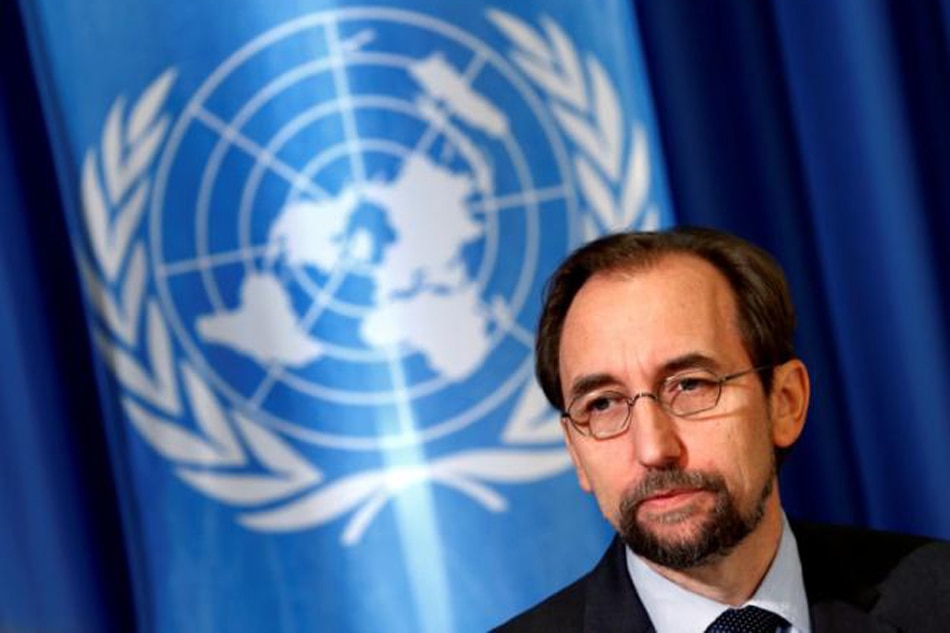編譯:觀察者網 徐乾昂
針對“禁毒戰爭”,國際社會近日向菲律賓出招。總統杜特爾特上周還放出“抓我仍需100萬年”的豪言,今天(14日),他就宣布 “菲律賓將撤出《國際刑事法庭羅馬規約》”。
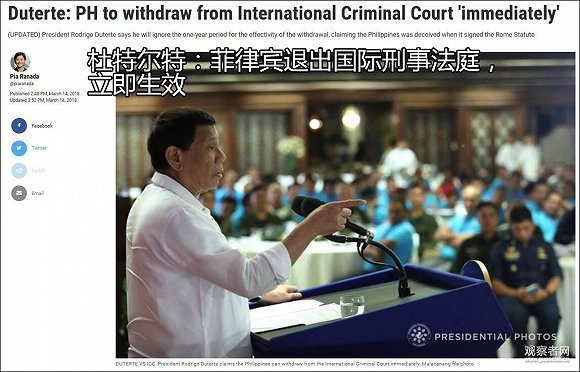
據菲律賓Rappler新聞網14日消息,杜特爾特以書麵形式向外界告知:“作為菲律賓總統,我現在決定,菲律賓將撤出《國際刑事法庭羅馬規約》,並立即生效。”究其原因,路透社表示,這是菲律賓受到聯合國、國際刑事法庭的雙重壓力導致。
作為國際刑事法庭的條約基礎,《羅馬規約》規定,一國必須以書麵形式向聯合國秘書長申請,需要等1年才能解除締約,而並不是所謂“立即生效”。對此,杜特爾特解釋道:1年時限不適用於菲律賓,因為當初菲律賓在成為國際刑事法庭成員國時“存在程序上的漏洞”。
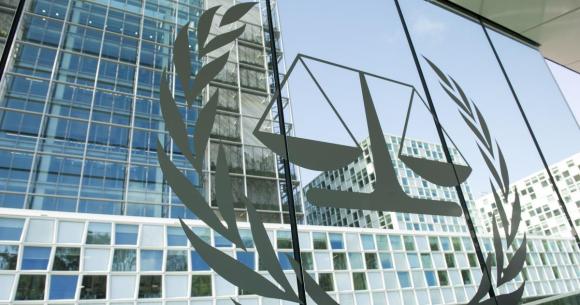
前總統阿基諾三世於2011年簽署、並批準了《羅馬規約》,宣布菲律賓接受國際刑事法院的管轄。杜特爾特口中的“漏洞”,則是“該國際法並未獲得菲律賓本土法律的認可”。
《菲律賓民典法(Civil Code)》第二條規定,任何法律要在菲律賓本土生效,必須要在官方公報(Official Gazette)或報紙上刊登示眾15天。而《羅馬規約》,並沒有在官方公報上刊登。
此外路透社稱,國際刑事法庭隻有在“目標國司法體係奔潰”的情況下才有權介入。杜特爾特表示“我國的司法體係健全完好”。
從上任以來,杜特爾特的“禁毒戰爭”出現多次爭議,西方社會因此指責菲律賓總統有涉嫌“違反人道罪”等嫌疑。在多次呼籲下,國際社會在近日開啟了對菲律賓的“圍攻”。
先是國際刑事法庭在2月8日宣布啟動對菲律賓的“預先檢查(preliminary examination)”;然後是在上周,聯合國人權特別調查員卡拉瑪德(Agnes Callamard)稱要趕赴菲律賓“實地考察”。
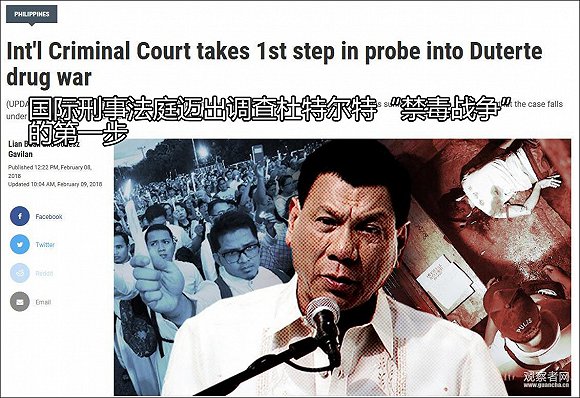
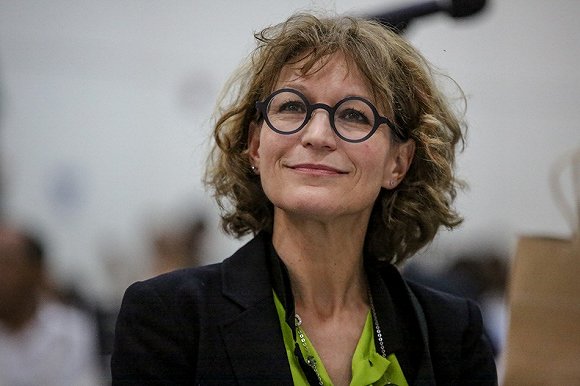
麵對國際社會步步逼近,此前還表示“為救國願把牢底坐穿”、“如果有罪就直接把我槍斃”的杜特爾特,如今態度開始轉變——他不僅要“扇卡拉馬德的耳光”,還要將她“扔去喂鱷魚”。
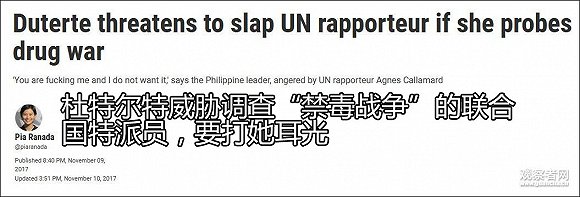
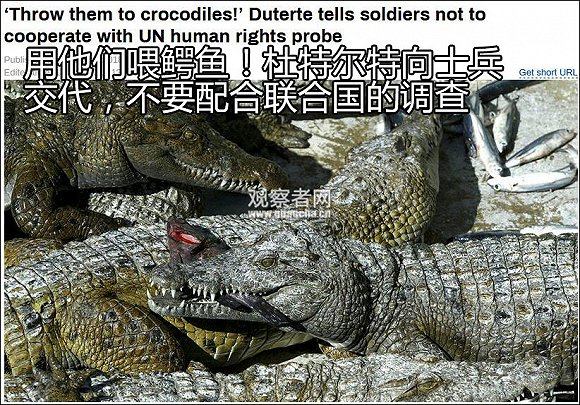
一周前,麵對有關“會不會去國際刑事法院受審”的問題,杜特爾特在深夜“非常自信”地稱,國際社會的調查將會止步於“初期檢查”。而一周後,菲律賓宣布退出國際刑事法院。路透社對此解釋,這是菲律賓受到聯合國、國際刑事法庭的雙重壓力導致。
然而,早在2016年11月,上任菲律賓總統不久的杜特爾特,就已經透露出“退意”。在那一年的《羅馬規約》締約國第15次會議開幕之際,俄羅斯突然在11月16日宣布退出國際刑事法院(ICC)。一天後,杜特爾特表示,“我們可以效仿俄羅斯”。
國際刑事法院是一個基於《羅馬規約》成立的獨立機構。該規約於1998年在意大利羅馬獲得通過並於2002年生效,目前有109年個締約國,另外39個國家已簽署、但尚未批準這項規約。
2002年,美國和以色列取消了對羅馬規約的簽署,宣布不再承擔相應法律義務。來源:觀察者網
Rodrigo Duterte to pull Philippines out of international criminal court
Hannah Ellis-Petersen South-east Asia Correspondent Wed 14 Mar 2018 13.17 GMT
Rodrigo Duterte is to withdraw the Philippines from the international criminal court after it opened a crimes against humanity investigation into his brutal war on drugs.
In a lengthy statement, the Philippines president accused the ICC and the UN of a crusade against him, denouncing what he described as “baseless, unprecedented and outrageous attacks on my person”.
“I therefore declare and forthwith give notice, as president of the republic of the Philippines, that the Philippines is withdrawing its ratification of the Rome statute [the treaty that established the ICC] effective immediately,” said Duterte.
The ICC announced last month it was investigating allegations that Duterte had committed crimes against humanity in his war on drugs, which has killed an estimated 8,000 people since he took office in May 2016.
Duterte initially said he welcomed the chance to defend his name. But on Wednesday he said the ICC had shown a “brazen ignorance of the law” and claimed that the Rome statute was fraudulently implemented in the Philippines to begin with and therefore not “effective or enforceable”.
Philippine politicians met the announcement with scorn and anger. Congressman Antonio Tino said the move was “utterly self-serving and driven by sheer panic at the prospect of a trial before the ICC for crimes against humanity related to his murderous war on drugs”. Tino added: “Saving his own skin has taken precedence over the long-term commitment made by the Philippines state to human rights.”
Kabataan party representative Sarah Elago said it showed that “Duterte intends to impose his fascist and tyrannical tendencies even against international critics”.
“Only the guilty become too eager to run away from prosecution,” Elago added. “If indeed he wants to prove his innocence, what better platform than a court?”
Relations between the Philippines and the international community have become increasingly antagonistic in recent weeks. Last week, the department of justiceincluded a UN special rapporteur on a list of people declared to be communist terrorists. In response, the UN high commissioner for human rights, Zeid Ra’ad Al Hussein, said Duterte “needs to submit himself to some sort of psychiatric examination”.
In his statement on Monday, Duterte said Hussein’s comments were clear evidence of “international bias” and that the ICC was “being utilised as a political tool against the Philippines”.
He also described the ICC’s inquiry – which involves looking into a 77-page report submitted to it last year that allegedly documents Duterte’s crimes against humanity going back to 1988 when he was mayor of Davao – as “unduly and maliciously created”.
When the Philippines ratified the Rome statute in 2011 – nine years after it came into force – it was seen as a big step forward for human rights in Asia. The country’s withdrawal will be seen as a blow for international accountability in the region. The ICC, based in The Hague, is the world’s only permanent international tribunal that looks into war crimes and crimes against humanity.
Duterte has made his contempt for the ICC well-known in the past, calling it “bullshit”, “hypocritical” and “useless”, but in his statement on Wednesday, he went further, accusing the court of violating its own due process and depriving him of the right of innocence until proven guilty.
Should the ICC’s preliminary inquiries find evidence of crimes against humanity, the Philippines’ sudden withdrawal from the statute would not protect Duterte from being put on trial. A country’s withdrawal from the ICC takes effect a year after the UN has received the application and article 127 of the Rome statute specifies that “withdrawal shall not affect any cooperation with the court in connection with criminal investigations”.
James Gomez, Amnesty International’s south-east Asia director, described Duterte’s move as misguided and deeply regrettable. “Powerful individuals in the Philippines are more interested in covering up their own potential accountability for killings than they are in ensuring justice for the many victims of the country’s brutal war on drugs’,” Gomez said.
There are 139 countries signed up to the Rome statute, but with some powerful exceptions. The US signed the treaty in 2000 but never ratified it, citing concerns over sovereignty, similarly with Russia. Israel signed it for a short period but also never ratified it into law.
Should the UN accept Duterte’s withdrawal, it would make the Philippines only the second country to withdraw from the Rome statute, following Burundi in 2017. South Africa attempted to leave in 2016, but its withdrawal was revoked by the UN.






